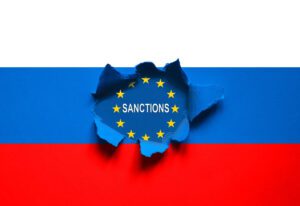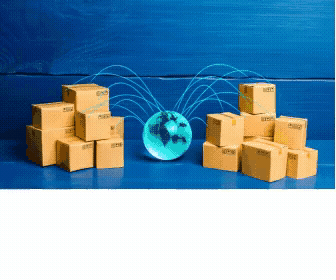The first part of an interview with the owner of the agricultural holding A.G.R. Group, Misak Khidiryan, and Board Chairman of A.G.R. Group Ihor Shestopalov about the key challenges of the past year – Russia’s invasion and forced change of conditions and destinations of agricultural crops export.
By Oleksiy Kozachenko
What did you see at your agricultural cluster in Kyiv region after the “goodwill gesture” of the Russian troops?
Misak Khidiryan: Our Brovary cluster in Kyiv region was occupied in the spring. The Russian occupiers knocked out the gates with an armored personnel carrier, took the guards hostage and began to loot: they stole diesel fuel, equipment from warehouses, damaged expensive agricultural machinery. In addition, during missile and artillery attacks, the Rushists damaged storage silos, grain drying complex, and a grain storage facility with a capacity of 20,000 tonnes. The shelling also caused damage to the vehicles in the winter storage – John Deere tractors and trailed units. Up to the point that the occupiers broke the doors in self-propelled sprayers in order to get the radios. They couldn’t take it – they just destroyed the panels.
The holding spent more than UAH 5 million for partial repairs. The restoration of the cluster took one month and a half – we rushed to get back in line and returned to work as soon as the sowing and harvesting campaigns started.
Some manufacturers of agricultural machinery left the Ukrainian market when the war broke out. How did this fact affect the working capacity of your agricultural machinery park?
Ihor Shestopalov: The situation with spare parts is very difficult today. We have to wait for a part of the ordered items – we pay in advance and wait for the delivery. We try to solve the problems with the repairs of equipment on our own – something we process, something we weld, and then we continue to work. We repair equipment by our own efforts, we diagnose it with relevant software.
Before the war, we planned to buy tractors, trailed units, and sunflower reapers. Last year we used our own equipment and only leased Case IH combines to harvest sunflower crops.
Despite everything, we continue to work on precision farming technologies, and this is justified. Our Kinze and Väderstad seeders are set up to sow with a sowing rate depending on the crop and the set depth, which eliminates overseeding and sowing errors due to automatic section shutdown.
Our tractors and sprayers are equipped with the iTEC system to minimize operator work. We set up BoomTrac, an automatic height measuring system for the sprayer boom above the soil or plant. Our grain harvesters and tractors work with an RTK signal. Each combine operator has his own name card, without which he will not be able to unload the harvested products.
Did you provide the military with equipment in wartime?
Misak Khidiryan: Near the Brovary cluster, there was a lot of broken Russian equipment, which we pulled with our tractors for further transfer to the Armed Forces of Ukraine (AFU) – there were mostly broken tanks, but there were also intact ones. Part of the equipment of the invaders was dragged to our base, loaded onto trawls, and taken for repairs. It was such that one tank had to be pulled out of the fields by three powerful tractors. We also went to neighboring villages and pulled trophies of the Rushists from people’s gardens.
In spring, we passed six MAZ trucks with trailers, a fuel truck, Niva and Renault Duster cars, Toyota Hilux pickup trucks to the AFU and the Territorial Defense Forces, as well as supplied the Ukrainian defenders with fuel. By the way, they returned the fuel truck when the occupiers retreated from Kyiv region, and it was successfully used during the sowing campaign.
What did you do to mines and remains of munitions in Kyiv region?
Misak Khidiryan: We decided that the sowing campaign should take place under any conditions. We found a demining team that went to the fields every day with our agronomists and looked for anti-tank mines and unexploded ordnance. Meanwhile, a special commission was invited to document the facts of destruction and theft by Russian troops.
In fact, it took a month and a half to resume the operation of the cluster, of which about ten days were spent on demining the fields. We started to till the soil and apply fertilizers on April 10-11, and a week later we started sowing corn. We also received permission from the AFU and the Territorial Defense Forces to work during the curfew so that our machine operators could work around the clock. The forces agreed and even organized the escort of machine operators at night because at that moment sabotage and reconnaissance groups continued to operate in the region.
As for the employees, more than 90% returned to their jobs. When it was possible, we transferred our workers from the occupied territories to the main office and clusters. In particular, a mechanical engineer was hired from Mykolaiv cluster. Another three machine operators, who are internally displaced persons, were hired from Kherson and Mykolaiv regions.
The Russian aggression forced the agricultural sector to develop new logistic corridors. What have you managed to do during the past year?
Ihor Shestopalov: When the war broke out, A.G.R. Group and MK Merchants S.A. owned by Misak Khidiryan, reoriented logistics to the EU market from seaports to motor, rail transport and river ports of Reni and Izmail. However, even after the end of the war and de-occupation, we will continue to export part of our grain in this direction. Due to this fact, we are interested in grain storage facilities and agricultural enterprises in the west of Ukraine – this will help us to reduce the logistics leg and facilitate export to the EU.
Currently, we are investing in the restoration of assets damaged by the Russian troops – we have already repaired a dryer and a grain silo in Brovarsky cluster. We are studying how to restore the grain infrastructure in Mykolaiv cluster after its recent liberation by the AFU.
Logistics was abnormally expensive in 2022. How did you cope with that?
Misak Khidiryan: For Ukraine, the economic feasibility of exporting to Asian and African countries through EU seaports is questionable, since transshipment and reloading cost 50-60% of the cost of grain, which makes this method of export unprofitable for farmers. Directing exports to the EU can only be beneficial for exports to end consumers in the EU.
If we evaluate the work of the “grain” corridor, the UN data show that most of the grain exports from Ukraine over the past three months went to Spain, Turkey, Italy, China, and the Netherlands. It was the return of Ukraine to the world agricultural markets after the opening of the grain corridor that contributed to a decrease in world food prices, which eased the food problem for the poorest countries.
We are also actively exporting along the “grain” corridor. Frankly, this is a risky option due to long queues, delays in inspections of grain trucks by the Russian side, and generally very slow operation. But given the current situation with the cost of logistics during the war, I consider the grain corridor a good opportunity.
In the end, the European railway is unable to transport the volumes of grain needed by Ukraine, and not only grain. In order to make full use of the European infrastructure for export, we need to open additional railway and road checkpoints on the border with Ukraine, and, of course, build a European gauge in our country.
What about your road and railway transportation?
Ihor Shestopalov: Throughout the year, we accelerated and facilitated our own business processes, applied to the relevant official structural units of the EU and Ukraine to increase the speed of cargo delivery, and actively used vehicles. Probably, it is necessary to gather representatives of ministries, agribusinesses, exporters, and relevant associations, put together a complete picture of the obstacles to logistics in the EU, and jointly find ways to solve these problems.
Consider that the cost of transporting grain by rail increased several times over the year. Before the war, delivering grain to the port cost $6-7 per tonne, and now it costs $10-12 per tonne. The rate of Ukrzaliznytsia for a grain carrier is UAH 4,500 per day for export transportation and UAH 2,500 per day for domestic transportation. With this tariff, the wagon component in the cost of transportation is $50 and $19 per tonne of grain per day. Add the services of a transshipment terminal – $15-30 per tonne, although before the war it cost $9-10 per tonne. The transportation of his cargo across Ukraine will cost an agrarian $80-120 per tonne, and for our farms – about $90-95 per tonne from the elevator to the port. The cost of logistics has increased several times.
As for trucking, we, like most farms, faced a shortage of grain carriers. A.G.R. Group passed more than a dozen own vehicles to the AFU. As for the rest, we have the opportunity to control the location of our vehicles and build a schedule for their work so that the export does not stop for a day.
Could you please clarify what, where and in what amount you export?
Ihor Shestopalov: Soybean, rapeseed, barley, wheat, corn, sunflower, buckwheat – we are considering all possible markets for products in the EU, Turkey, Egypt, and Nepal. Since the beginning of the full-scale invasion, we have exported almost 55,000 tonnes. Our partners from MK Merchants transport grain through the river ports of Izmail and Reni and ship an average of eight to ten vessels per month.
What will you sow this year? Are you planning to switch to oilseeds?
Misak Khidiryan: Next year we plan to abandon the cultivation of corn – we will sow soybeans and sunflowers. Growing corn is now problematic – prices for drying and processing are high, and the purchase prices are low. In 2023, we planned to grow wheat and rapeseed, we expected to sow winter wheat in September, immediately after sunflower harvesting. But the weather did not allow us to go out into the field, and in October it was too late to sow wheat, so we had to abandon it.
Did you manage to buy commodities and materials?
Ihor Shestopalov: We had to abandon anhydrous ammonia, the production of which is 99% associated with the aggressor country. In the spring we plan to use carbamide in the fields. As for nitrogen and phosphorus-potassium fertilizers, some of them have already been purchased.










